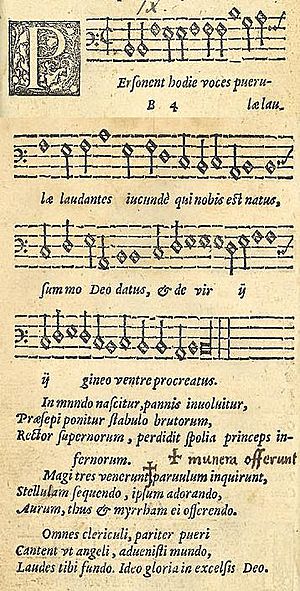Personent hodie facts for kids
Personent hodie is a well-known Christmas carol that first appeared in a Finnish songbook called Piae Cantiones in 1582. This book was a collection of 74 old songs from the Middle Ages, all written in Latin. A Swedish church leader named Jacobus Finno gathered these songs.
The carol's tune is very similar to one found in a German book from 1360. This old book came from a city called Moosburg in Bavaria. Because of this, people often say the song dates back to the 1300s.
Contents
The Song's Old Story
The Latin words of "Personent hodie" are likely based on an even older song from the 1100s. That song started with "intonent hodie voces ecclesie" and was written to honor Saint Nicholas. Saint Nicholas is famous for being the patron saint of children, sailors, and Russia. He is also known for bringing gifts on his special day, December 6.
Some experts, like Hugh Keyte and Andrew Parrott, have noticed that two parts of the song have a special double repeat in the Latin words. The carol's words were probably changed for the Feast of the Holy Innocents, which is celebrated on December 28. On this day, young singers and their "boy bishop" (a boy chosen to act as a bishop for the day) would take the place of the older church leaders in the choir. Even today, this carol is often sung around Holy Innocents' Day.
Songs from Piae Cantiones were sung in Finland for a long time, even into the 1800s. The book became known in Britain when a rare copy was given to a British official in Stockholm. He then gave it to John Mason Neale in 1852. Neale, working with Thomas Helmore, used this book to publish some of the songs in collections in 1853 and 1854.
How the Song Was Translated
The most common English version of "Personent hodie" was written by Jane M. Joseph (1894–1929). She used the pen name "James M. Joseph." Her translation is titled "On this day earth shall ring."
However, there are other English versions too. For example, Elizabeth Poston's "Boys' Carol" from 1965 starts with "Let the boys' cheerful noise/Sing today none but joys." John Mason Neale also wrote "Let the Song be Begun," which uses the carol's tune but different words. Aidan Oliver's translation says, "Today let the voices of children resound in joyful praise of Him who is born for us."
Different Musical Versions
The carol became much more popular in England after Gustav Holst (1874–1934) arranged it in 1916. He wrote it for voices singing together with an orchestra. This version is often played in churches and cathedrals as a song for processions. Holst's arrangement is frequently part of the Festival of Nine Lessons and Carols. It was even featured in a broadcast from King's College Chapel, Cambridge in 2011. Sometimes, this version is called "Theodoric," which comes from Holst's middle name.
Besides Holst's version, there are many other arrangements. Hugh Keyte and Andrew Parrott created a version for choirs in the New Oxford Book of Carols. Antony Pitts also made an arrangement for the Naxos Book of Carols. John Rutter has two arrangements: one for choir and orchestra that sounds like old medieval instruments, and another for female or boys' voices with harp or piano.
Some recorded versions of the carol sound more like folk music. For instance, Maddy Prior and The Carnival Band performed it on their 1987 album A Tapestry of Carols, using old-style instruments. The singing group Anonymous 4 also recorded the song with its original "Intonent hodie" words on their CD Legends of St. Nicholas.
The English music group North Sea Radio Orchestra recorded an instrumental version of the piece in 2008. It features instruments like violins, cello, clarinet, and piano. Jazz musician Wayne Shorter also recorded his own version of the melody in 2003, calling it 12th Century Carol.
Robert Cummings, a music writer, described the carol's tune as "glorious and lively." He said it has bright, strong three-note parts that rise and then fall. Bass guitarist Chris Squire recorded his own arrangement in 2007, with guitarist Steve Hackett and the English Baroque Choir.
The Words of the Song
Here are the Latin words of "Personent hodie" and their English translation:
| Latin text of "Personent hodie" (1582) | English translation by Jane M. Joseph (1894–1929) |
|---|---|
| Personent hodie voces puerulae, laudantes iucunde qui nobis est natus, summo Deo datus, et de vir, vir, vir (2x) |
On this day earth shall ring with the song children sing |
| In mundo nascitur, pannis involvitur |
His the doom, ours the mirth; when he came down to earth, |
| Magi tres venerunt, munera offerunt, |
God's bright star, o'er his head, Wise Men three to him led; |
| Omnes clericuli, pariter pueri, |
On this day angels sing; with their song earth shall ring, |
In some versions, like the one by Gustav Holst, the third verse has slightly different Latin words.
See also
 In Spanish: Personent hodie para niños
In Spanish: Personent hodie para niños
 | Victor J. Glover |
 | Yvonne Cagle |
 | Jeanette Epps |
 | Bernard A. Harris Jr. |


